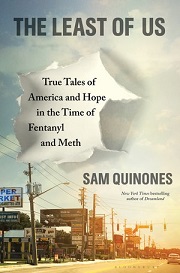For The Least of Us, why did Quinones decide to put a spotlight on both fentanyl and methamphetamine? He explained that never before had anyone seen one source, in this case Mexico, provide one illegal drug nationwide, let alone two. “These drugs were the most potent and powerful and deadly, in the case of fentanyl, that we’d ever, ever seen.” To make matters worse, the drug crises was intensified when Covid-19 hit in early 2020. By that time, both fentanyl and methamphetamine were already widespread and prevalent in the United States. “People in recovery from drug addiction all of a sudden, you know, one of the big things they always tell you in drug treatment is ‘do not isolate’… very dangerous thing to do when you are trying to recover from drug addiction and all of a sudden everybody has to isolate and all the 12-step meetings go from being hands-on and in-person to Zoom and that just doesn’t really work as well and then, of course, a lot of people lose their jobs because a lot of the jobs that were lost were jobs that recovering addicts after years outside of the labor force, they were doing those jobs, working in restaurants, dishwasher, what have you, that kind of thing, so now all of a sudden maybe a lot of those folks are out of work… and what you begin to find is people having very stressful times, everybody is in stress, nobody around to help them through it or talk you through it, and then at the same time when they do end up relapsing, the drugs are not even cocaine and heroin anymore. It’s fentanyl, which is so deadly… and methamphetamine, which is driving people to mental illness very quickly all across the country… and so what you begin to find was all these people going from this extraordinary pandemic, unprecedented pandemic, into another unprecedented situation, which is two drugs, everywhere, pretty much in the United States, and that would be the drug that you would most likely relapse on and so people began dying and that’s why you begin to see these enormous leaps in overdose deaths all across the country. It’s really because, I think, of that and just the spread of these drugs that are so damaging to the human brain.”

…I also wanted to write about stories of people, Americans, in the smallest way possible, just doing what they could to repair and strengthen community, because in that I believed lay the solutions, plural, to what ails us and to me that became even more important than the story about synthetics. It became a book about hope and that’s why I used the word hope in the title. It became about how do we move beyond this…


In a time when drug traffickers act like corporations and corporations like traffickers, our best defense, our only defense, lies in bolstering community. We are only as strong as our most vulnerable.

Podcast: Play in new window | Download
Subscribe: RSS

Want to join the discussion?
Feel free to contribute!